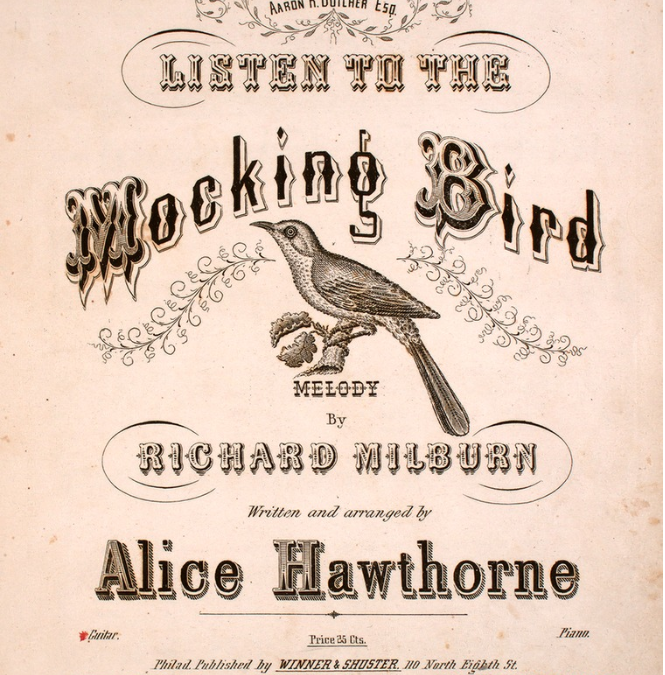
Listen to the Mockingbird
This classic American folk tune has been around in various forms, and surely you, dear reader, will recognize the timeless melody. In fact, you might have heard it and not realized it was this song.
The melody was written by a man named Richard Milburn. Some accounts attribute him to be a singing barber from Philadelphia who literally whistled while he worked, other accounts quote he was a beggar and a street musician. Either way, Septimus Winner, a song writer with many pseudonyms who gifted American folk music with many classic songs, overheard the melody and was inspired to write the lyrics to accompany it. This song is generally attributed to Alice Hawthorne, one of Septimus Winner’s pseudonyms and an interesting choice considering gender-swapped pseudonyms were more common for women during this time.

Published in 1855 by Winner & Shuster in Philadelphia
This song has snuck its way into popular culture through parody and variations since the civil war, making it a classic that has proven the test of time. The first variation to be well documented was written about the Battle of Vicksburg, and you can find all the information you’d like to know about that on the Bard of the South’s blog including lyrics and a brief history of the Battle of Vicksburg itself.

Copyright 1936 by the Calumet Music Co. in Chicago
The song has been featured in square dances, as a part of the Three Stooges Theme Song, on The Flintstones as a parody called ‘Listen to the Rockin’ Bird‘, and even on the children’s show Barney and Friends with the lyrics changed to put more emphasis on the beautiful trill of the mockingbird and less on the sad original lyrics referencing the death of sweet Hallie (or Hadley). This song has been known to travel and has even been transcribed into a version for Hawaiian ukelele and guitar chorus. Today it is most popular in folk circles and as a contest fiddle tune where the fiddle imitates bird calls.
Below is one of the first known recordings of Listen to the Mockingbird by John Yorke Atlee:
More Info – Links Below:
Wikipedia – Listen to the Mockingbird
Wikipedia – Septimus Winner
Wikipedia – Richard Milburn
The Lester S. Levy Sheet Music Collection
Ted Widmer’s NY Times Article
Bard of the South
Learn to Play the Song with Bluegrass Daddy
Library of Congress Entry
Mention in ‘Unsung: A History of Women in American Music’